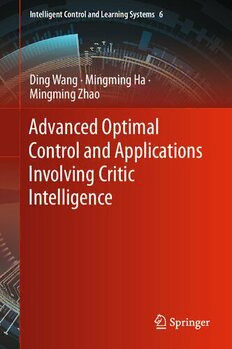Table Of ContentIntelligent Control and Learning Systems 6
Ding Wang · Mingming Ha ·
Mingming Zhao
Advanced Optimal
Control and Applications
Involving Critic
Intelligence
Intelligent Control and Learning Systems
Volume 6
SeriesEditor
DongShen ,SchoolofMathematics,RenminUniversityofChina,Beijing,
Beijing,China
The Springer book series Intelligent Control and Learning Systems addresses the
emergingadvancesinintelligentcontrolandlearningsystemsfrombothmathemat-
ical theory and engineering application perspectives. It is a series of monographs
andcontributedvolumesfocusingonthein-depthexplorationoflearningtheoryin
controlsuchasiterativelearning,machinelearning,deeplearning,andotherssharing
thelearningconcept,andtheircorrespondingintelligentsystemframeworksinengi-
neeringapplications.Thisseriesisfeaturedbythecomprehensiveunderstandingand
practicalapplicationoflearningmechanisms.Thisbookseriesinvolvesapplications
inindustrialengineering,controlengineering,andmaterialengineering,etc.
TheIntelligentControlandLearningSystembookseriespromotestheexchangeof
emergingtheoryandtechnologyofintelligentcontrolandlearningsystemsbetween
academia and industry. It aims to provide a timely reflection of the advances in
intelligent control and learning systems. This book series is distinguished by the
combination of the system theory and emerging topics such as machine learning,
artificialintelligence,andbigdata.Asacollection,thisbookseriesprovidesvaluable
resources to a wide audience in academia, the engineering research community,
industry and anyone else looking to expand their knowledge in intelligent control
andlearningsystems.
· ·
Ding Wang Mingming Ha Mingming Zhao
Advanced Optimal Control
and Applications Involving
Critic Intelligence
DingWang MingmingHa
FacultyofInformationTechnology SchoolofAutomationandElectrical
BeijingUniversityofTechnology Engineering
Beijing,China UniversityofScienceandTechnology
Beijing
MingmingZhao Beijing,China
FacultyofInformationTechnology
BeijingUniversityofTechnology
Beijing,China
ISSN 2662-5458 ISSN 2662-5466 (electronic)
IntelligentControlandLearningSystems
ISBN 978-981-19-7290-4 ISBN 978-981-19-7291-1 (eBook)
https://doi.org/10.1007/978-981-19-7291-1
©TheEditor(s)(ifapplicable)andTheAuthor(s),underexclusivelicensetoSpringerNature
SingaporePteLtd.2023
Thisworkissubjecttocopyright.AllrightsaresolelyandexclusivelylicensedbythePublisher,whether
thewholeorpartofthematerialisconcerned,specificallytherightsoftranslation,reprinting,reuse
ofillustrations,recitation,broadcasting,reproductiononmicrofilmsorinanyotherphysicalway,and
transmissionorinformationstorageandretrieval,electronicadaptation,computersoftware,orbysimilar
ordissimilarmethodologynowknownorhereafterdeveloped.
Theuseofgeneraldescriptivenames,registerednames,trademarks,servicemarks,etc.inthispublication
doesnotimply,evenintheabsenceofaspecificstatement,thatsuchnamesareexemptfromtherelevant
protectivelawsandregulationsandthereforefreeforgeneraluse.
Thepublisher,theauthors,andtheeditorsaresafetoassumethattheadviceandinformationinthisbook
arebelievedtobetrueandaccurateatthedateofpublication.Neitherthepublishernortheauthorsor
theeditorsgiveawarranty,expressedorimplied,withrespecttothematerialcontainedhereinorforany
errorsoromissionsthatmayhavebeenmade.Thepublisherremainsneutralwithregardtojurisdictional
claimsinpublishedmapsandinstitutionalaffiliations.
ThisSpringerimprintispublishedbytheregisteredcompanySpringerNatureSingaporePteLtd.
The registered company address is: 152 Beach Road, #21-01/04 Gateway East, Singapore 189721,
Singapore
Preface
Nowadays,wearegoingthroughaprofoundrevolutioninallwalksoflife,duetothe
rapid development of artificial intelligence and intelligent techniques. Among the
numerous amazing achievements, intelligent optimization methods are commonly
applied,notonlytoscientificresearchbutalsotopracticalengineering.Thoseappli-
cationareascovercybernetics,computerscience,computationalmathematics,and
so on. Remarkably, the idea of optimization plays an important role in artificial-
intelligence-based advanced control design and is significant to construct various
intelligent systems. Unlike the ordinary linear case, nevertheless, the nonlinear
optimalcontrolisoftendifficulttoaddress.Particularly,withthewidepopularityof
networkedtechniquesandtheextensionofcomputercontrolscales,moreandmore
dynamical systems are encountered with the difficulty of building mathematical
modelsaccuratelyandareoperatedbasedonincreasingcommunicationresources.
Forexample,theintelligentoptimalcontrolofwastewatertreatmentsystemsisan
importantavenueofresourcescyclicutilizationwhencopingwiththemodernurban
diseases.However,therealwaysexistobviousnonlinearitiesanduncertaintieswithin
wastewatertreatmentprocesses.Becauseofthemoreandmorecommondynamics
complexity,itisalwaysdifficulttoachievedirectoptimizationdesignandtherelated
control efficiencies are often low. Therefore, it is necessary to establish advanced
optimalcontrolstrategiesforcomplexdiscrete-timenonlinearsystems.
Characterizedbyagent-environmentinteraction,reinforcementlearningisclosely
relatedtodynamicprogrammingwhenconductingintelligentoptimizationdesign.
Duringtheadaptivecriticframework,reinforcementlearningiscombinedwiththe
neuralnetworkapproximatortocopewithcomplexoptimizationproblemsapproxi-
mately.Inthelasttwodecades,theadaptivecriticmechanismhasbeenwidelyusedto
solvecomplexoptimalcontrolproblemsandmanyexcellentresultshavebeendevel-
opedinthesenseofadaptiveoptimalcontroldesign.Thisbookintendstoreportnew
optimal control results with critic intelligence for complex discrete-time systems,
whichcoversthenovelcontroltheory,advancedcontrolmethods,andtypicalappli-
cations for wastewater treatment systems. Therein, combining with artificial intel-
ligence techniques, such as neural networks and reinforcement learning, the novel
intelligentcriticcontroltheoryaswellasaseriesofadvancedoptimalregulationand
v
vi Preface
trajectory tracking strategies are established for discrete-time nonlinear systems,
followed by application verifications to complex wastewater treatment processes.
Consequently, developing such kind of critic intelligence approaches is of great
significancefornonlinearoptimizationandwastewaterrecycling.
Overall,tenchaptersareincludedinthisbook,focusedonbackgroundintroduc-
tion (Chap. 1), optimal regulation (Chaps. 2–4), trajectory tracking (Chaps. 5–7),
and industrial applications particularly wastewater treatment (Chaps. 8–10). Prof.
DingWangcontributestoeachofthetenchapters.Dr.MingmingHacontributesto
Chaps. 1–3, 5–8. Dr. Mingming Zhao contributes to Chaps. 1, 4, 9, and 10. They
performthediscussion,revision,andimprovementforalltenchapters.
InChap.1,consideringlearningapproximatorsandthereinforcementformula-
tion,alearning-basedcontrolframeworkisestablishedandappliedtointelligentcritic
learningandcontrolforcomplexnonlinearsystemsunderunknowndynamicswithin
discrete-timedomain.Inaddition,thebases,thederivations,andrecentprogressesof
criticintelligencefordiscrete-timeadvancedoptimalcontroldesignarepresented.
Intermsofnormalregulationandtrajectorytracking,theadvancedoptimalcontrol
methodsarealsoverifiedviasimulationexperimentsandwastewatertreatmentappli-
cations,whicheffectivelyaddressunknownfactorsforcomplexnonlinearsystems,
observablyenhancecontrolefficiencies,andreallyimproveintelligentoptimization
performances.
InChap.2,basedonaneffectiveheuristicdynamicprogrammingalgorithm,the
adaptiveevent-triggeredcontrollerisdesignedforaclassofdiscrete-timenonlinear
systemswithconstrainedinputs.First,toconquercontrolconstraints,anonquadratic
performance index is introduced and the triggering threshold is provided with
stabilityanalysisusingtheLyapunovtechnique.Second,threeneuralnetworksare
constructed in the algorithm scheme and a novel weight initialization approach is
developed to improve approximation accuracy of the model network. Simulation
resultsfurtherdemonstratethevalidityoftheproposedstrategybycomparisonwith
thetraditionalmethod.
In Chap. 3, the event-based self-learning optimal regulation is developed for
discrete-time nonlinear systems based on the iterative dual heuristic dynamic
programmingalgorithm,whichsubstantiallydecreasesthecomputationcost.First,
duringtheiterativeprocess,theconvergenceoftheevent-basedadaptivecriticalgo-
rithmisdiscussed.Second,anappropriatetriggeringconditionisestablishedsoasto
ensuretheinput-to-statestabilityoftheevent-basedsystem.Inaddition,themixed-
driven control framework is clarified with data and event considerations. Simula-
tionexamplesareconductedtodemonstratetheeffectivenessandsuperiorityofthe
proposedapproachwhencomparedwiththetraditionaltechnique.
InChap.4,aneffectivegeneralizedvalueiterationalgorithmisestablishedtodeal
withthediscountednear-optimalcontrolissueforsystemswithcontrolconstraints.
First,anonquadraticperformancefunctionisintroducedtoovercomesaturationand
the initial cost function is selected as an arbitrary positive semidefinite function
insteadofzero.Consideringconstrainedsystemswiththediscountfactor,themono-
tonicityandconvergenceoftheiterativecostfunctionsequencearediscussed.Then,
inordertoimplementtheproposedalgorithm,twoneuralnetworksareconstructed
Preface vii
toapproximatethecostfunctionandthecontrolpolicy.Additionally,twosimulation
examplesareconductedtocertifythevalidityoftheproposedmethod.
In Chap. 5, a novel neuro-optimal tracking controller is developed based on
valueiterationfordiscrete-timenonlinearsystems.Theoptimaltrajectorytracking
problem is transformed into the optimal regulation problem through constructing
a new augmented system. Then, the convergence of the iterative cost function for
the value-iteration-based tracking control algorithm is provided and the uniformly
ultimately bounded stability of the closed-loop system is discussed. In addition,
theheuristicdynamicprogrammingalgorithmisutilizedtoimplementtheproposed
methodandtwosimulationsareconductedtotestifytheeffectivenessoftheproposed
strategy.
InChap.6,adata-basedoptimaltrackingcontroltechniqueisestablishedbased
on the iterative dual heuristic dynamic programming algorithm for discrete-time
nonaffine systems. In order to implement the proposed algorithm, three neural
networksareconductedtoapproximatethesystemmodel,thecostatefunction,and
the control strategy, respectively. In addition, when the model network is trained,
biases are introduced to improve identification accuracy and the gradient descent
algorithmisutilizedtoupdateweightsandbiasesofalllayers.ThroughtheLyapunov
approach,theuniformlyultimatelyboundedstabilityisdiscussedandthesimulation
iscarriedouttodemonstratethevalidityoftheproposedmethod.
In Chap. 7, the discounted optimal control design is developed based on the
adaptivecriticschemewithanovelperformanceindextosolvethetrackingcontrol
problemforbothnonlinearandlinearsystems.First,thetrackingerrorscannotbe
eliminatedcompletelyinpreviousmethodwithatraditionalperformanceindex.To
dealwiththeproblem,anovelcostfunctionisintroduced.Second,thecostfunction
inoptimaltrackingcontrolcannotbedeemedasaLyapunovfunction,andtherefore
thenewstabilityanalysisisdiscussedtoensurethetrackingerrortendstozeroasthe
numberoftimestepsincreases.Twonumericalsimulationsareperformedtoverify
theeffectivenesswiththecomparationofthetrackingperformancefortheiterative
adaptivecriticdesignsunderdifferentperformanceindexfunctions.
InChap.8,adata-driveniterativeadaptivecriticschemeisdevelopedtodealwith
thenonlinearoptimalfeedbackcontrolprobleminwastewatertreatmentsystems.In
order to ensure the dissolved oxygen concentration and the nitrate level are main-
tainedattheirdesiredsettingpoints,theiterativeadaptivecriticcontrolframework
is established. In this way, faster response and less oscillation are obtained using
theschemecomparedwiththeincrementalproportional–integral–derivativemethod
andtheconvergenceisdiscussed.Inaddition,themixed-drivencontrolframework
isalsointroducedandthenappliedtothewastewatertreatmentplant.Thesimulation
demonstrates the effectiveness of the proposed intelligent controller for nonlinear
optimizationandwastewaterrecycling.
InChap.9,adata-driveniterativeadaptivetrackingcontrollerinvolvingthedual
heuristicdynamicprogrammingstructureisestablishedtoimprovethecontrolperfor-
manceofthedissolvedoxygenconcentrationandthenitratenitrogenconcentrationin
theconstrainednonlinearplantofwastewatertreatment.First,toaddressasymmetric
constraintsofthecontrolinput,anonquadraticperformancefunctionisintroduced.
viii Preface
Then,thesteadycontrolstrategyisobtainedandthenextsystemstateisevaluatedby
themodelnetwork.Throughapplyingtothewastewatertreatmentplant,theproposed
methodisverifiedtobefeasibleandefficient.
In Chap. 10, based on the accelerated generalized value iteration algorithm, a
hybridintelligenttrackingcontrolstrategyisdevelopedtoachieveoptimaltracking
for a class of nonlinear discrete-time systems. Both offline and online training are
utilized,wheretheformercanobtaintheadmissibletrackingcontrollawandthelatter
canenhancethecontrolperformance.Inaddition,theaccelerationfactorisintroduced
to improve the performance of value iteration and the admissible tracking control
isobtained.Theinput–outputdataoftheunknownsystemiscollectedtoconstruct
the model neural network, so as to attain the steady control and the approximate
controlmatrix.Consideringapproximationerrorsofneuralnetworks,theuniformly
ultimatelyboundedstabilityisdiscussedviatheLyapunovapproach.Twoexamples
withindustrialapplicationbackgroundsareinvolvedtodemonstratetheavailability
andeffectivenessoftheproposedmethod.
Beijing,China DingWang
Beijing,China MingmingHa
Beijing,China MingmingZhao
September2022
Acknowledgements
TheauthorswouldliketothankProf.DerongLiu,Prof.JunfeiQiao,andProf.Long
Cheng for providing valuable discussions when conducting related research. The
authorsalsowouldliketothankJinRen,XinXu,andHuilingZhao,forpreparing
somebasicmaterialsofthisbook.TheauthorsalsowouldliketothankNingGao,
PengXin,LingzhiHu,JunlongWu,JiangyuWang,XinLi,ZihangZhou,Wenqian
Fan, Haiming Huang, Ao Liu, Yuan Wang, and Hongyu Ma, for checking and
improvingsomechaptersofthebook.
TheauthorsareverygratefultoNationalKeyResearchandDevelopmentProgram
of China (Grant 2021ZD0112302), the National Natural Science Foundation of
China(Grant62222301,61773373),andBeijingNaturalScienceFoundation(Grant
JQ19013), for providing necessary financial support to our research in the past 4
years.
ix

